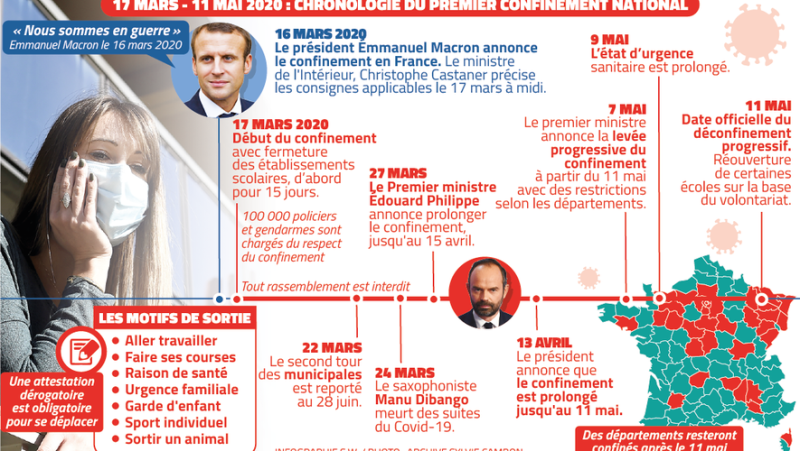CASE. “Working with each other”, “I gained in comfort of life”: teleworking born from confinement divides

Le 17 mars 2020, c'est le début du confinement en France. Infographie Sophie Wauquier
Dans la vie professionnelle de bon nombre de Français, le confinement et l'avènement du télétravail a bousculé durablement les habitudes. Des entreprises l'encouragent partiellement, d'autres le refuse.
The latest survey published by Apec (Association for the Employment of Executives), last Tuesday, confirms a major trend intrinsically linked to the first confinement: teleworking has captured the hearts of many French people. In detail: two-thirds work at least one day at home per week, or even two days for a quarter of them.
The enthusiasm continues unabated and the study also shows that 70% would be unhappy if what they now consider to be a given were removed and 45% would even be ready to resign… It is therefore a strong element of attractiveness for certain companies.
"Less hours in traffic, more sleep time"
"I gained in comfort of life. In our company, we have two days of teleworking per week, which means less driving, fewer hours lost in traffic and, above all, more time to sleep!", rejoices Alexis, an engineer from Hérault within a digital services company.
He remembers that during Covid-19, all the employees "played the game" by continuing to work despite confinement.
"I have an office work room which I now use to telework", says- he. "Our leaders understood that the work was done in the same way remotely as in person, there is just Monday which is imposed and Tuesday for monthly meetings ."
"We prioritize being all together"
Do not, however, talk to Pierre, an entrepreneur from Languedoc, employing around fifty people in the service sector, about leaving his employees at home.
"We favor being all together through our activities, technicians, lawyers, financiers, this requires everyone to work together with the others", he defends.
As a result, there is no teleworking within his company. Because he only sees disadvantages: the difficulty in sending messages to everyone, the endless exchanges of emails, the risk of remaining connected beyond the requested time.
"In recruitment, we are asked the question, we say "no", that makes a filter"
He also assures us that many employees were unhappy during Covid-19, cut off from others, while they worked at home. A contrarian vision which, he thinks, is not a deterrent to hiring.
"It's true that in recruitment, many ask us the question of teleworking, we tell them “no" , it cools some of them, they decline, but it gives us a filter", assumes Pierre who, in return, offers large offices to his employees and even a gym.
But many companies are looking to bring their employees back to the workplace while young people, especially, don't want to hear about it.
"I alternate between the two, it’s best and for employees too, we must maintain social ties and exchange to have ideas", says Marc, marketing manager of a Languedoc tertiary company.
Less travel, more savings
Covid-19 and then the way of working by videoconference have also generated substantial savings on travel abroad, which he now chooses sparingly.
"Three or four days in Paris, the rest in the South", finally rejoices Sophie, who works in a communication box and which has ties to the Gard, the happiest since post-Covid-19.
“Covid is not that far away”: for housing, people are still looking for fresh air
A consequence of this first oppressive confinement of spring 2020 remains this need for air for all those who have lived locked up.
"People who have spent three months in an apartment do not want to repeat the experience, Covid is not that far away", recalls Franck Minella, agent at Casanova Immobilier in Montpellier.
So, the rush for housing with a garden, terrace or simple balcony continues: "Before confinement, it’was difficult to sell a garden level or a ground floor on the ground floor, there we found a buyer straight away."
The specialist still notes, despite the scarcity of goods, the arrival of Parisians in Hérault, Gard and throughout the South, mixing teleworking and return trips.
"The Covid has increased all prices, a house near Montpellier has gone from 260,000 € at 430,000 €.
People want a small house, ready to drive, even if some want one in nature and run away because there is no cinema, illustrates Helene Fraysse, of Syneos Immobilier . But it's over, prices are falling again."
Broadcast in Millau or Rodez in Aveyron, Romain Guidice, from Expertimo, remembers when "the phone rang in all directions to have a terrace or a balcony even if it meant breaking his piggy bank, during the first confinement.
Today, in this rural department, there are many "second main residences where people work hard for three days" in town and in Aveyron the rest of the time. The demand has barely subsided: “The criterion with exterior is systematic, even if it’s just a table and two chairs on a terrace, this trauma has remained in people's memory.& ;quot;
Yan.Phi.
I subscribe to read more


